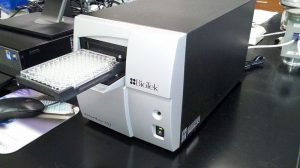The annual International Genetically Engineered Machine (iGEM) competition challenges students to expand the field of synthetic biology to solve tangible problems. While most iGEM projects involve imbuing microorganisms with useful new traits and adding them to a global toolkit, Penn Engineering students took a unique approach to the iGEM challenge by creating an open-source blueprint for a mechanical instrument that could make biological research more accessible.
Penn Bioengineering undergraduate Andrew Clark and recent graduates Karol Szymula, now a research assistant in Penn’s Complex Systems Lab, and Michael Patterson, now the lab engineer for Penn Bioengineering’s Instructional Laboratories, contributed to the project that originated through the 2017 iGEM challenge. Graduate student Michael Magaraci, who started Penn’s iGEM program as an undergraduate, and Sevile Mannickarottu, director of Instructional Laboratories, also participated. Brian Chow, Assistant Professor in Bioengineering at Penn, who helped create the iGEM competition when he was an MIT graduate student, oversaw the project.
Read the full story at Penn Engineering’s Medium Blog. Media contacts Evan Lerner and Lauren Salig.

